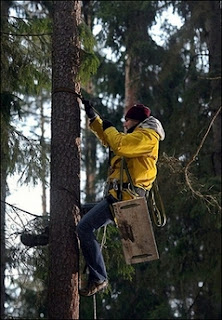ROSPUDA RIVER VALLEY, Poland: A sharp wind rustles the brittle wetland grasses, and the snow crunches underfoot — the only sounds in the Rospuda River valley, home to one of Europe's last and best preserved peat bogs.
The bog and surrounding pine forest — a home to eagles, wolves, lynx and wild orchids which survived a Communist regime notorious for its disregard for the environment — have become the center of a strident dispute between Poland and the EU over plans to build a highway there.
The road would relieve the heavy truck traffic clogging the nearby town of Augustow and provide a big economic boost to a rapidly developing region. But the EU says cutting across the habitat of rare plants and animals would wreak havoc with ecosystems and destroy the area's pristine beauty.
Similar debates are raging across the newer European Union member states, which are being forced to balance preservation of endangered environments against their desire to catch up economically with their richer western neighbors.
In Poland, which joined in 2004, national authorities are pushing for the construction of a €115 million (US$150 million) highway that is to slice across the wetlands — but the zone is protected by the European Union's habitat law NATURA 2000.
EU Environment Commissioner Stavros Dimas has rejected the highway plan, and in a rare move underscoring the seriousness of the dispute said this week he would seek a court injunction to suspend construction.
Tucked away in a thick pine forest near the Lithuanian border, some 300 kilometers (190 miles) northeast of Warsaw, the Rospuda River valley survived the unrestrained industrial development of the 19th century and 45 years of communism untainted, professor Ludwik Tomialojc, head of the Committee on Nature Conservation at the Polish Academy of Science, told The Associated Press.
"It is a place that so far has been undisturbed by the economy," Tomialojc said. "It wasn't drained during communism when most everything was drained to mud. It lies in a forest and didn't attract anyone's special attention."
The bog was once a river-fed lake that over several thousand years turned into a peat bog. This winter, in temperatures of minus 15 Celsius (5 Fahrenheit), the frozen wetlands can be walked on, with their stumpy, twisted pines, slender birches and clumps of earth and brown grass poking out from beneath the snow.
In summer, the valley bursts into a lush green forest flecked with the white bark of birch trees. Kayakers paddle the river as the bog becomes impassable for humans.
The EU's two newest members — Bulgaria and Romania, which joined the bloc on Jan. 1 — are also struggling for ways to reconcile the needs of the environment and economic development.
In Bulgaria, landowners are pushing for looser limits on land protection in order to cash in on the country's booming real estate market, while environmentalists want more land protected under the NATURA 2000 program. In Romania, environmentalists and authorities in the Black Sea coast town of Constanta are wrestling over efforts to build a tourist resort — with discos and water skiing — on a lake island called Siutghiol, home to 45 species of birds.
Despite warnings from Brussels, Polish authorities on Feb. 9 approved plans to construct a 17-kilometer (10-mile) section of the Via Baltica highway, linking Poland to Finland, that for 500 meters (yards) would cut through the peat bog valley and bypass Augustow. Environmentalists argue that heavy construction equipment and support pillars will destroy rare species and want the road to circumvent the valley.
Prime Minister Jaroslaw Kaczynski has warned that bowing to environmentalists would set a precedent that could threaten the entire plan to build some 7,000 kilometers (4,000 miles) of badly needed highways in Poland by the year 2020.
Kaczynski defended the highway by saying that if the valley was to remain intact, the road would have to go through other rare habitats, provoking different protests.
Augustow residents want the road, arguing that too many people having been run over by trucks driving through the town.
"We need this highway like we need air to breath. How many people have died!" said Irena Koprowicz, a 57-year-old flower vendor.
"Day and night, nonstop the trucks rumble through here. Nothing will happen to the frogs and flowers. This highway is absolutely necessary."
Some 100 environmental activists have set up treetop tents to prevent heavy machinery from entering the area. Already, dots of orange paint mark hundreds of trees that are to be cut down.
"We've never said that nature is more important that people," said Greenpeace spokesman Jacek Wisniarski, sitting at a small campfire at the protesters' forest camp. "We've always said this road should be built, just not here, not through the valley."
Source:iht.com







